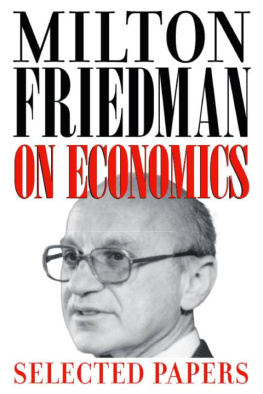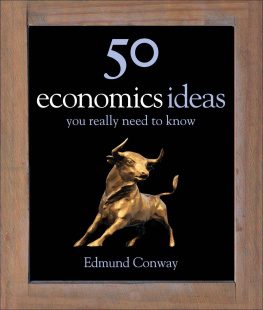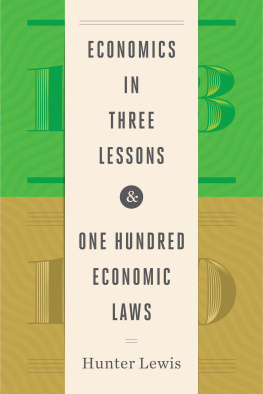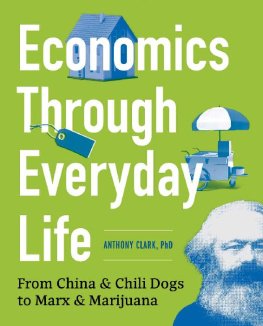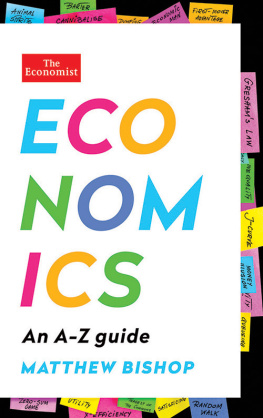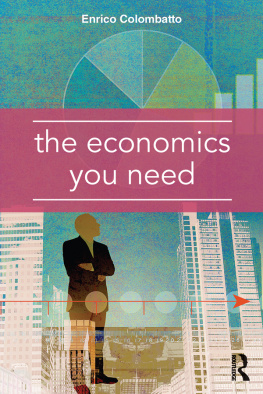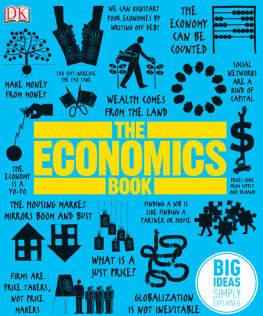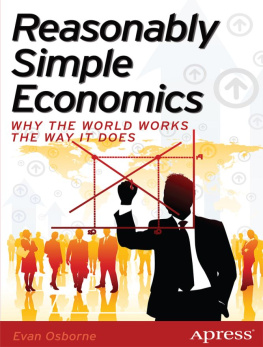The Traveling Economist
Using Economics to Think about What Makes Us All So Different and the Same
Todd A. Knoop, PhD

Copyright 2017 by Todd A. Knoop, PhD
All rights reserved. No part of this publication may be reproduced, stored in a retrieval system, or transmitted, in any form or by any means, electronic, mechanical, photocopying, recording, or otherwise, except for the inclusion of brief quotations in a review, without prior permission in writing from the publisher.
Library of Congress Cataloging in Publication Data
Names: Knoop, Todd A., author.
Title: The traveling economist : using economics to think about what makes us all so different and the same / Todd A. Knoop, PhD.
Description: First Edition. | Santa Barbara : Praeger, An Imprint of ABC-CLIO, LLC, [2017]
Identifiers: LCCN 2016051279 | ISBN 9781440852367 (hard copy) | ISBN 9781440852374 (eISBN)
Subjects: LCSH: Economics. | EconomicsSociological aspects. | Economic policy. | Technological innovationsEconomic aspects. | GlobalizationEconomic aspects.
Classification: LCC HB171 .K626 2017 | DDC 330dc23
LC record available at https://lccn.loc.gov/2016051279
ISBN: 978-1-4408-5236-7
EISBN: 978-1-4408-5237-4
21 20 19 18 17 1 2 3 4 5
This book is also available as an eBook.
Praeger
An Imprint of ABC-CLIO, LLC
ABC-CLIO, LLC
130 Cremona Drive, P.O. Box 1911
Santa Barbara, California 93116-1911
www.abc-clio.com
This book is printed on acid-free paper 
Manufactured in the United States of America
Copyright Acknowledgments
All images courtesy of Todd A. Knoop, PhD
To my Fellow Travelers, particularly
Rhawn, Sunil, Eric, Brian, Deb, Edie, and Daphne
Contents
Preface
The point of going somewhere like the Napo River in Ecuador is not to see the most spectacular anything. It is simply to see what is there. We are here on the planet only once, and might as well get a feel for the place.
Annie Dilllard
Why is something as difficult as travel also one of the greatest joys of life? People find delight in travel for many reasons: to encounter new people and new places, to investigate novel cultures and diverse ways of living, to experience beauty (both man-made and natural), and to simply break out of the routines of ordinary life. But what all of these reasons have in common is that we enjoy travel because it allows us to experience difference. As humans, we have a predilection toward homogeneity. We have an inborn desire to be tribal and associate with those who are similar to us, and we yearn for home and the places that are most familiar. But humans are also evolutionarily hard-wired to enjoy the thrill of experiencing the uncommon. It is this desire that has led to exploration and the expansion of humans across the planet (and even off it). The lure of the new and interestingthe appeal of the exoticis a desire that is as inborn as the need for social interaction or comfort. Travel is the way we explore difference and scratch the itch of experiencing the unusual.
So what does economics have to do with travel? At a superficial level, it might seem very little. The traditional definition of economics is that it is the study of how societies distribute scarce resources. Nothing about travel in that. But an alternative definition of economics has been gaining wider acceptance recently, a definition of economics that the father of economics Adam Smith had in mind when he said: It is not from the benevolence of the butcher, the brewer, or the baker that we expect our dinner, but from In this modern view, economics is really about the study of how people respond to incentives in order to further their own interests. This modern view shifts the focus of economics away from scarcityon what people dont haveand toward incentiveson what people actually receive when they take specific actions. The recasting of economics as the study of how people respond to incentives has three radical implications for how economics can help us better understand the ways that people behave, think, and interact across the globe.
First, this new definition emphasizes the fact that different people live in different environments and face a diverse set of rewards and punishments at varying times. These diverse incentives motivate different behaviors across people and even in the same person over timenot just economic behaviors but social and personal as well. Unfortunately, many of these actions profit one person but hurt everybody elserobbery, for instance. So when economists study incentives, we are not only interested in how certain incentives prod people into taking certain actions, but we are also interested in how governments and societies can shape incentives in ways that encourage people to behave in ways that benefit both themselves and society as a whole. For instance, one of the primary challenges of economics is to develop policies, laws, and enforcement systems that incentivize people to produce their own goods (where everyone stands to benefit) and not just steal the goods of others (where someone benefits only at a cost to others).
Second, the economic focus on incentives does not mean that incentives are only financial rewards or penalties. They could also be social incentives, such as the approval or the condemnation of peers, or physical incentives, such as avoiding punishment or gaining comfort. The key is that these incentives are rewards or punishments that people care about.
The third, and most important, implication of this modern definition of economics is that because the incentives that impact human behavior are so much broader than the narrow financial incentives that are typically associated with economics, economics has expanded the scope of its investigations well beyond the study of how people trade goods and services. Economics focuses not only on supply, demand, income, unemployment, etc., but also has extended its reach into the study of a much wider array of individual and societal interactions. Modern economics has something to say about why family structures have evolved over time, how political special interests impact public policy, what factors influence crime rates, why religious practices differ and change, how parents choose the names of their babies, how to foster better public health practices, and many other topics that dont explicitly relate to narrow business transactions.
Using this innovative perspective, economists have gained new insights into the determinants of difference across people, cultures, societies, countries, and time. Economics has become a powerful tool that can be used to make each of us much more perceptive observers. As a result, developing a deeper understanding of economics is an important part of becoming a better traveler. Travelers who have fostered their economic insight will be those who get the most out of their travels because they will be better able to appreciate their experiences. If we travel to observe beauty and experience alternative lifestyles, then a lack of economic sense leads to a blindness that prohibits us from seeing these things as they actually are. Such a lack of perception deadens our experiences and makes them less enjoyable. Learning the insights of modern economics and appreciating how economists view the world can help travelers better comprehend their experiences, and with better comprehension, many deeper truths will reveal themselves. In effect, a deeper understanding fostered by a better awareness of economics can allow a tourist (someone who sees what they know is there) to become an explorer (someone who learns anew each and every day from what they see).
Next page

